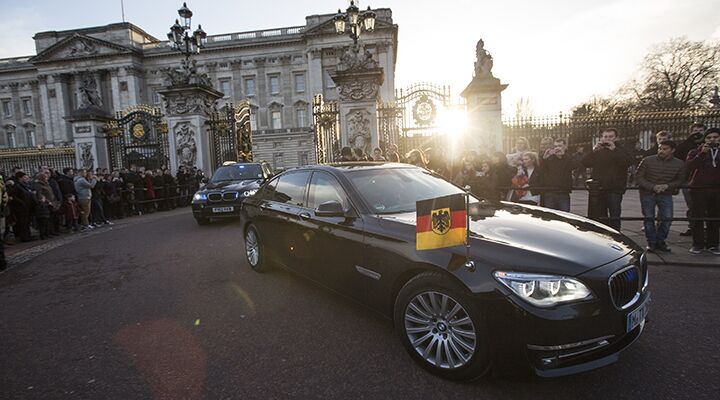
Britain Launches German Charm Offensive
Britain spared no expense as it welcomed German Chancellor Angela Merkel for her whirlwind trip to London on February 27. As the nation rolled out what the press has dubbed the “reddest of red carpets,” Mrs. Merkel became the second-ever German chancellor to address both houses of Parliament, before meeting with Prime Minister David Cameron and then having tea with the Queen in Buckingham Palace. And all this for a visit that lasted only 6 hours.
“Cameron is sparing no expense to win the chancellor round to EU reforms,” Spiegel wrote. Mr. Cameron “can’t show enough how important” Mrs. Merkel is to Britain, according to the Süddeutsche Zeitung. “You have been received almost like a queen of Europe!” a German reporter told her during a press conference of the two leaders.
Contrast that with Mr. Cameron’s reception of François Hollande a few weeks earlier, where the two simply went for lunch at the pub.
Mr. Cameron is desperately seeking the German leader’s help. Parts of Britain’s EU membership are becoming a real problem. Mr. Cameron wants to renegotiate that relationship, and the best person to help with that is the de facto leader of the EU: Mrs. Merkel.
In her speech to Parliament, Mrs. Merkel gave Mr. Cameron a little hope. In essence, her message was that Germany would support a reform of the EU, but not a complete revolution. “We need a strong United Kingdom with a strong voice inside the European Union,” she said. “If we have that we will be able to make the necessary changes for the benefit of all.”
The British press is still debating whether Merkel’s support for limited reform is a victory or defeat for Mr. Cameron. But the real story here is the way Britain has gone after Germany’s help.
In several passages, the Bible warns that the modern nations of Israel (primarily Britain, the United States and Israel) will look to foreign allies to solve their problems, instead of looking to God. It compares those nations to a woman seeking lovers (e.g. Hosea 2; Ezekiel 23; Lamentations 1).
That metaphor is reflected exactly in Britain’s emotional and showy pursuit of Mrs. Merkel’s affection. This wasn’t some kind of negotiation, where Britain tried to persuade Germany to do them a favor for something in return. Instead Mr. Cameron acted more like someone trying to impress a girlfriend.
The flashiest program possible was laid out for the German chancellor. The venue for her speech—the Royal Gallery in the Palace of Westminster—is literally covered in gold, and has to be one of the most impressive speech venues in the world. The only other Germans to address both houses of Parliament here were Chancellor Willy Brandt in 1970 and President Richard Von Weizsäcker in 1986.
Then Mr. Cameron even got the Queen involved, using Buckingham Palace, one of the nation’s most famous landmarks, in his effort to charm.
In other words, this trip was about romance, not reason.
None of this turned Mrs. Merkel’s head. Her speech set out a logical negotiating position—saying that Germany was open for change, but without setting a price or making clear how much change Britain would be able to buy.
But Britain’s pursuit of her lover will continue. The Bible prophesies that Britain will continue to look to foreign allies to solve her problems, until she finally learns to put her trust in God and not man. For more on this prophesied lovers’ relationship, see Trumpet editor in chief Gerald Flurry’s article “The Good News Behind a German-Dominated Europe.”
